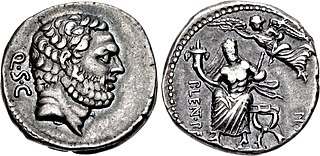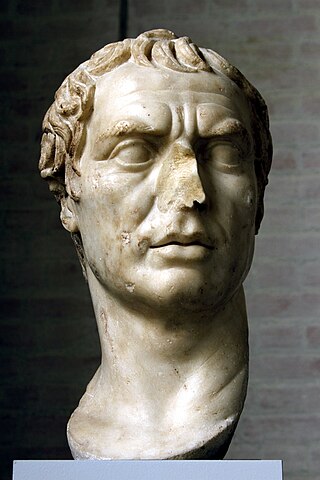Related Research Articles

Marcus Antonius, commonly known in English as Mark Antony, was a Roman politician and general who played a critical role in the transformation of the Roman Republic from a constitutional republic into the autocratic Roman Empire.

This article concerns the period 49 BC – 40 BC.
Publius Cornelius Dolabella was a Roman politician and general under the dictator Julius Caesar. He was by far the most important of the patrician Cornelii Dolabellae but he arranged for himself to be adopted into the plebeian Cornelii Lentuli so that he could become a plebeian tribune. He married Cicero's daughter, Tullia, although he frequently engaged in extramarital affairs. Throughout his life he was an extreme profligate, something that Plutarch wrote reflected ill upon his patron Julius Caesar.

Quintus Fufius Calenus was a Roman Republican politician and general. When Fufius was plebeian tribune in 61 BC he was an ally of Publius Clodius Pulcher during the Bona Dea affair. During his praetorship in 59 BC he supported Julius Caesar who was then consul. Fufius later served under Caesar at the close of the Gallic Wars and during the civil war that followed. For his services he was made consul in 47 BC. After Caesar's death in 44 BC, he supported Mark Antony against Cicero during the ensuing conflict in the senate. As an ally of Antony governing Cisalpine Gaul, he died of illness in 40 BC on the cusp of intervening in the Perusine War.
The gens Baebia was a plebeian family at ancient Rome. The first member of the gens who obtained the consulship was Gnaeus Baebius Tamphilus, in 182 BC. During the later Republic, the Baebii were frequently connected with the patrician family of the Aemilii.

Publius Cornelius Lentulus Spinther was a Roman politician and general. Hailing from the patrician family of the Cornelii, he helped suppress the Catilinarian conspiracy during his term as curule aedile in 63 BC and later served as consul in 57 BC. Denied the opportunity to invade Egypt the following year, he nevertheless won some victories in his province of Cilicia and celebrated a triumph over it in 51 BC.
Marcus Calpurnius Bibulus was a politician of the Roman Republic. He was a conservative and upholder of the established social order who served in several magisterial positions alongside Julius Caesar and conceived a lifelong enmity towards him. In 59 BC, he was consul alongside Julius Caesar. Their partnership was contentious to the extent that Caesar's supporters assaulted Bibulus in Rome's main forum on the eve of an important vote. Bibulus withdrew from public politics for the rest of his term.
Julia was the mother of the triumvir general Mark Antony.
Lucius Marcius Philippus was a politician and senator in the late Roman republic. He was governor of Syria from 61 to 60 and later served in the consulship of 56 BC. He was also step-father of the emperor Augustus.
Quintus Pedius was a Roman politician and general who lived during the late Republic. He served as a military officer under Julius Caesar for most of his career. Serving with Caesar during the civil war, he was elected praetor in 48 BC and was given a triumph for victories over the Pompeians during the civil war's second Spanish campaign.
Gaius Vibius Pansa Caetronianus was consul of the Roman Republic in 43 BC. Although supporting Gaius Julius Caesar during the Civil War, he pushed for the restoration of the Republic upon Caesar’s death. He died of injuries sustained at the Battle of Forum Gallorum.

The gens Cornelia was one of the greatest patrician houses at ancient Rome. For more than seven hundred years, from the early decades of the Republic to the third century AD, the Cornelii produced more eminent statesmen and generals than any other gens. At least seventy-five consuls under the Republic were members of this family, beginning with Servius Cornelius Maluginensis in 485 BC. Together with the Aemilii, Claudii, Fabii, Manlii, and Valerii, the Cornelii were almost certainly numbered among the gentes maiores, the most important and powerful families of Rome, who for centuries dominated the Republican magistracies. All of the major branches of the Cornelian gens were patrician, but there were also plebeian Cornelii, at least some of whom were descended from freedmen.
Lucius Gellius was a Roman politician and general who was one of two Consuls of the Republic in 72 BC along with Gnaeus Cornelius Lentulus Clodianus. A supporter of Pompey, he is noted for being one of the consular generals who led Roman legions against the slave armies of Spartacus in the Third Servile War.
Publius Servilius Isauricus was a Roman senator who served as consul in 48 BC together with Julius Caesar. He is generally regarded as a puppet of Caesar, having a long friendship with the Dictator.
Quintus Caecilius Metellus Celer was a Roman politician who was consul in 60 BC and in the next year opposed Pompey, Caesar, and the so-called First Triumvirate's political programme. He was a member of the powerful and influential plebeian noble family, the Caecilii Metelli. Prior to 62 BC, he was an ally of Pompey and had served as urban praetor in 63, augur by 63 BC, possibly aedile in 67 BC, and plebeian tribune in either 72 or 68 BC.
Lucius Valerius Flaccus was a consul of the Roman Republic in 100 BC and princeps senatus during the civil wars of the 80s. He is noted for his peace initiatives, which failed, and for sponsoring the Lex Valeria that created the dictatorship of Sulla.

Publius Cornelius Scipio Africanus was a Roman general and statesman, most notable as one of the main architects of Rome's victory against Carthage in the Second Punic War. Often regarded as one of the greatest military commanders and strategists of all time, his greatest military achievement was the defeat of Hannibal at the Battle of Zama in 202 BC. This victory in Africa earned him the honorific epithet Africanus, literally meaning "the African", but meant to be understood as a conqueror of Africa.
Lucius Scribonius Libo was a Roman politician and military commander who was consul in 34 BC and brother-in-law to the future emperor Augustus. Libo rose to prominence through his connections with Pompey. When Julius Caesar rebelled against the Roman Senate in 49 BC, Libo sided with Pompey. He carried out a variety of military, diplomatic and naval roles, with mixed success.
References
- ↑ Broughton 1952, pp. 88–90.
- ↑ Broughton 1952, pp. 135, 255.
- ↑ Broughton 1952, p. 143.
- ↑ Broughton 1952, p. 161.
- ↑ Broughton 1952, p. 171.
- ↑ Broughton 1986, pp. 2, 110.
- ↑ Broughton 1952, p. 238.
- ↑ Holmes 1923, p. 207.
- ↑ Broughton 1952, p. 292.
- ↑ Holmes 1923, p. 228.
- ↑ Syme (1939). The Roman Revolution. p. 170.
- ↑ Ferriès, Marie-Claire (2020). "Senatorum... incondita turba: was the senate compsoed so as to ensure its compliance?". In Pina Polo, Francisco (ed.). The triumviral period: civil war, political crisis and socioeconomic transformations. Prensas de la Universidad de Zaragoza. p. 92. ISBN 9788413400969.
- ↑ Broughton 1952, p. 351.
- ↑ Broughton 1952, p. 365.
- ↑ Zmeskal 2009 , pp. 140–41. Zmeskal records no known wife.